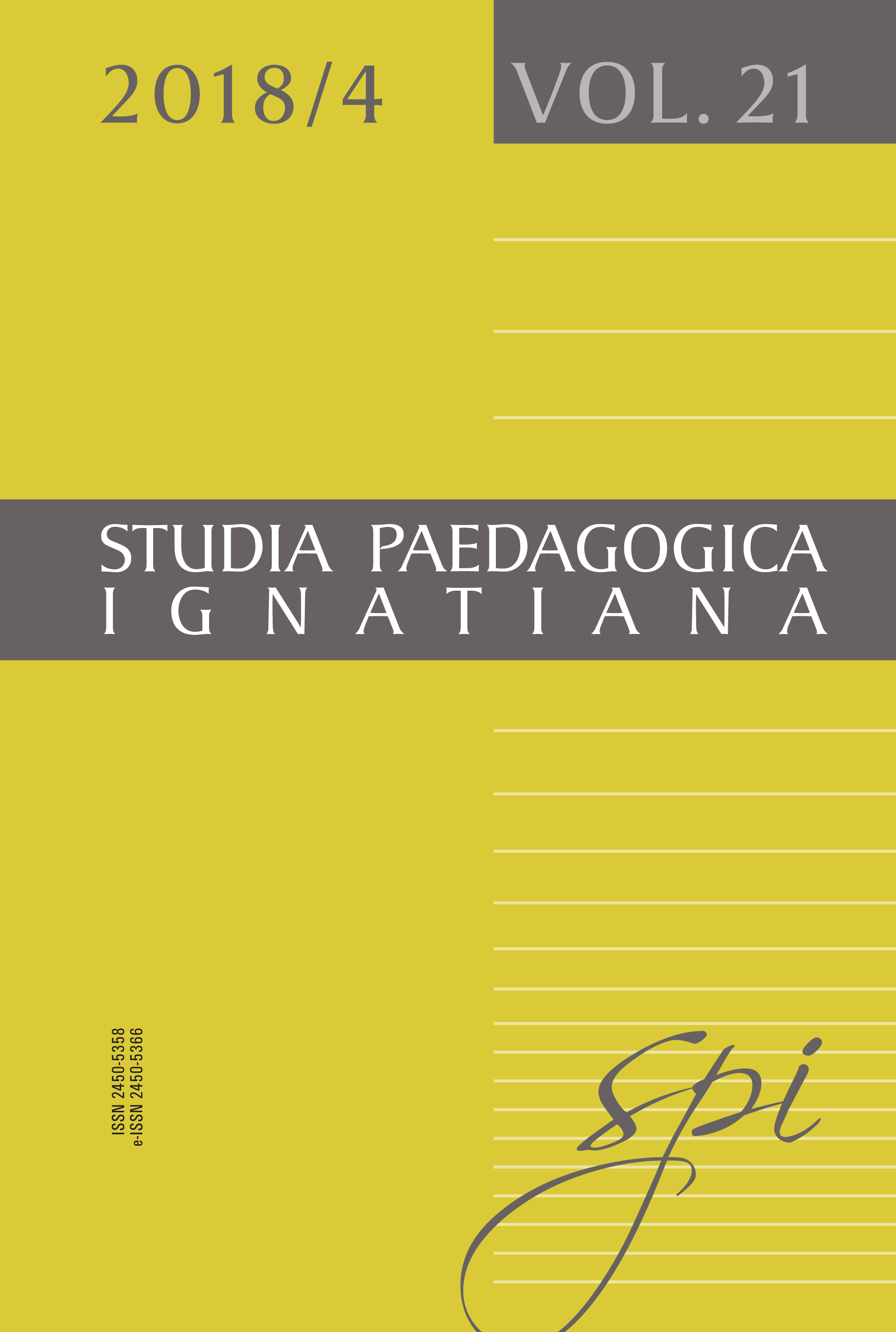Nadzieja – cnota usprawniająca jakość życia współczesnego człowieka
DOI:
https://doi.org/10.12775/SPI.2018.4.002Słowa kluczowe
nadzieja, struktura nadziei, jakość życia, pedagogika nadzieiAbstrakt
Nadzieja towarzyszy człowiekowi w dążeniu do spełnienia czegoś; co jest niezbędne i konieczne dla ludzkiej egzystencji. Przeciwdziała ona poczuciu utraty wartości najcenniejszych dla człowieka. Brak nadziei prowadzi człowieka do rozpaczy; a tym samym często do podejmowania decyzji prowadzących do nieodwracalnych sytuacji życiowych. Nadzieja pozwala przejść człowiekowi przez najtrudniejsze momenty i okresy życia. Z jednej strony kształtuje wizję egzystencjalną człowieka; przepełnioną jego ufnością; wiarą w lepszy; sprzyjający los; z drugiej oddziałuje na jego poczucie transcendencji; którą przenika otucha. Nadzieja usprawnia życie człowieka. I chociaż nie ma nadziei bez obaw; to jest ona drogą poszukiwania sensu życia. Nadzieja jest siłą chroniącą zwłaszcza tych; którzy stają na skraju rozpaczy przyjmującej postać poczucia beznadziejności. Jako byt racjonalny przypisany strukturze osobowości każdego człowieka; można ją postrzegać w kilku sprzecznych ze sobą wymiarach. Nadzieja jest przyczyną usprawniającą wszystkie wymiary życia każdego człowieka. Realizuje się poprzez świat wartości; ku którym człowiek zdąża i bez których nie może kształtować jakości swojego życia. Nadzieja ma swoją strukturę; przez którą należy rozumieć pewien układ osobliwych właściwości wchodzących z różną siłą we wzajemne relacje; które są jednocześnie jej elementami i stanowią całość decydującą o indywidualnym i niepowtarzalnym charakterze poczucia nadziei w przypadku każdego człowieka. Rodzi się pytanie o znaczenie nadziei; jej miejsce i rolę w procesach pedagogicznych; w których świadomymi podmiotami są osoby wychowywane i wychowujące. Pedagogika nadziei jest próbą wnikania w istotę szczególnie ważnych elementów/czynników wspomagających rozwój osobowości człowieka.
Bibliografia
Bauman Z.; 44 listy ze świata płynnej nowoczesności; Wydawnictwo Literackie; Kraków 2011.
Elementarz Benedykta XVI; Wydawnictwo WAM; Kraków 2008.
Gadacz T.; O umiejętności życia; Znak; Kraków 2002.
Grynberg M.; Oskarżam Auschwitz. Opowieści rodzinne; Wydawnictwo Czarne; Wołowiec 2018.
Grynberg M.; Ocaleni z XX wieku; Wydawnictwo Czarne; Wołowiec 2018.
Grynberg M.; Księga Wyjścia; Wydawnictwo Czarne; Wołowiec 2018.
Kołakowski L.; Czy Pan Bóg jest szczęśliwy i inne pytania; Znak; Kraków 2009.
Krasiński J.; Analiza i znaczenie nadziei; w: Nadzieja w postawie ludzkiej; red. W. Słomka; Wydawnictwo Towarzystwo Naukowe KUL; Lublin 1992; s. 15–20.
Marcel G.; Homo viator. Wstęp do filozofii nadziei; przeł. P. Lubicz; Pax; Warszawa 1959.
Papież Franciszek i Dominique Wolton; Otwieranie drzwi. Rozmowy o Kościele i świecie; przeł. M. Chojnacki; Wydawnictwo WAM; Kraków 2018.
Posmysz Z.; Królestwo za mgłą. Z autorką „Pasażerki” rozmawia Michał Wójcik; Znak – Literanova; Kraków 2017.
Ratzinger J. [Benedykt XVI]; Jezus z Nazaretu; przeł. W. Szymona; Wydawnictwo M; Kraków 2007.
Rottenberg A.; Proszę bardzo; W.A.B.; Warszawa 2009.
Skarga B.; Człowiek to nie jest piękne zwierzę; Znak; Kraków 2007.
Słownik wyrazów obcych; red. E. Sobol; Wydawnictwo Naukowe PWN; Warszawa 1995.
Ślipko T.; Trojakie oblicze wolności; w: Wolność jako wartość i problem edukacyjny; red. A.M. de Tchorzewski; Wydawnictwo WERS; Bydgoszcz 1999; s. 9‒15.
Tchorzewski A.M. de; O potrzebie i pożytkach nadziei; w: Nadzieja i sprawiedliwość jako sprawności moralne w wychowaniu; red. I. Jazukiewicz i E. Rojewska; Wydawnictwo Naukowe Uniwersytetu Szczecińskiego; Szczecin 2014; s. 17‒30.
Tchorzewski A.M. de; Sprawności moralne jako wyraz świadomości wychowawczej i kultury pedagogicznej; w: Sprawności moralne wychowawcy; red. I. Jazukiewicz i E. Rojewska; Wydawnictwo Przedsiębiorstwo Produkcyjno-Handlowe Zapol Dmochowski; Sobczyk; Szczecin 2013; s. 11‒27.
Tischner J.; Świat ludzkiej nadziei; Znak; Kraków 1992.
Pobrania
Opublikowane
Jak cytować
Numer
Dział
Licencja
Autor zgłaszając swój artykuł oświadcza, że:
jest Autorem artykułu (zwanego dalej Utworem) i:
- przysługują mu wyłączne i nieograniczone prawa autorskie do Utworu,
- jest uprawniony/a do rozporządzania prawami autorskimi do Utworu.
Udziela Uniwersytetowi Ignatianum w Krakowie nieodpłatnej, niewyłącznej, nieograniczonej terytorialnie licencji do korzystania z Utworu na następujących polach eksploatacji:
- utrwalania utworu w formie papierowej, a także na nośniku cyfrowym lub magnetycznym;
- zwielokrotnienia utworu dowolną techniką, bez ograniczenia ilości wydań i liczby egzemplarzy;
- rozpowszechniania utworu i jego zwielokrotnionych egzemplarzy na jakimkolwiek nośniku, w tym wprowadzenia do obrotu, sprzedaży, użyczenia, najmu;
- wprowadzenia utworu do pamięci komputera;
- rozpowszechniania utworu w sieciach informatycznych, w tym w sieci Internet;
- publicznego wykonania, wystawienia, wyświetlenia, odtworzenia oraz nadawania i reemitowania, a także publicznego udostępniania utworu w taki sposób, aby każdy mógł mieć do niego dostęp w miejscu i czasie przez siebie wybranym;
- w zakresie praw zależnych do Utworu, obejmujących w szczególności prawo do dokonania koniecznych zmian w Utworze, wynikających z opracowania redakcyjnego i metodycznego, a także do dokonania tłumaczenia Utworu na języki obce.
Udzielenie licencji następuje z chwilą przekazania Utworu na rzecz Uniwersytetowi Ignatianum w Krakowie. Uniwersytet Ignatianum w Krakowie jest uprawniony do udzielania dalszych sublicencji do Utworu, w zakresie udzielonego prawa. Licencja jest ograniczona czasowo i zostaje udzielona na okres 15 lat, licząc od daty jej udzielenia.
Polityka prywatności
Statystyki
Liczba wyświetleń i pobrań: 1259
Liczba cytowań: 0



